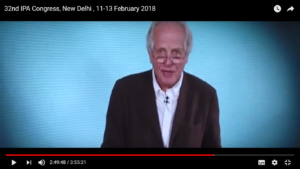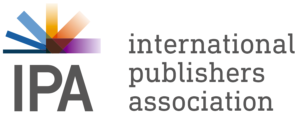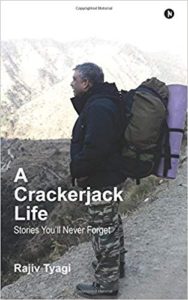Freedom of Speech and Prix Voltaire Prize, 32nd IPA Congress, 11-13 Feb 2018, New Delhi
From 11-13 February 2018 the 32nd International Publishers  Association (IPA) Congress was held at Taj Palace Hotel, New Delhi. The International Publishers Association (IPA) is the world’s largest federation of national, regional and specialist publishers’ associations. Its membership comprises 70 organisations from 60 countries in Africa, Asia, Australasia, Europe and the Americas. The congress was organised in Delhi along with the collaboration of the Federation of Indian Publishers ( FIP).
Association (IPA) Congress was held at Taj Palace Hotel, New Delhi. The International Publishers Association (IPA) is the world’s largest federation of national, regional and specialist publishers’ associations. Its membership comprises 70 organisations from 60 countries in Africa, Asia, Australasia, Europe and the Americas. The congress was organised in Delhi along with the collaboration of the Federation of Indian Publishers ( FIP).
It was a wonderful congress with multiple panel discussions that fortunately ran in succession rather than in parallel and many fascinating conversations were to be had on the sidelines. It was a phenomenal gathering of publishers from around the world. The full programme can be accessed here.
Day two the discussions continued as energetically as before. The highlights of the events on this day were the panel discussion on “The threat of self-censorship in publishing”. It was chaired by Kristenn Einarsson, CEO Norwegian Publishers Association; Chair, IPA Freedom to Publish Committee and the panelists were Trasvin Jittidecharak, Silkworm Books, Thailand and Jürgen Boos, President and CEO, Frankfurt Book Fair, Germany. 
The Keynote speech was delivered by Norwegian publisher William Nygaard. On 11 Oct 1993 he was shot three times in the back outside his home. Although the crime was never resolved it is widely believed that this was linked to the fatwa William Nygaard received for publishing Salman Rushdie’s Satanic Verses. Both before and after the attack he has been a great defender of the freedom to publish and of free speech. His speech begins at 2:49:41 in the YouTube link given below:
Kristenn Einarsson during the course of conversation remarked that through libel laws economic sanctions are being imposed so allowing not necessarily governments but also people in power to really hit you economically if you publish something they don’t like or go to court with. So just a threat of that is hindering publishing.” Juergen Boos confirmed that the perception of self-censorship is on the rise particularly with the more and more populist governments being elected to power. At 3:32:12 Kristenn Einarsson remarks that the panel should have included an Indian publisher who could not make it and then opened the discussion to the floor except that once again no Indian stood up instead Edward Nawotka, Bookselling and International News Editor, Publishers Weekly spoke. He can be heard speaking off camera. ( Another equally telling observation is that while composing this blog post I discovered that Amazon India does not sell Rushdie’s Satanic Verses despite selling all his other books! )
Later in the day the 2018 IPA Prix Voltaire award ceremony was held. The award was given to Chinese-born Swedish scholar Gui Minhai who is a prolific writer often commenting on Chinese politics and political figures. He is one of the three shareholders of Causeway Bay Books in Hongkong. He went missing in Thailand in late 2015. It was received on his behalf by his daughter Angela Gui. “I think that my father’s version of optimism is perhaps precisely the kind that Voltaire describes. It’s an optimism that in the face of unimaginable cruelty still believes in change. And it’s an optimism that isn’t crushed by lies, force and humiliation.”
Bangladeshi Publisher Faisal Arefin Dipan was given a posthumous Special Award. He was brutally hacked to death inside his office at the hands of suspected religious extremists for his association with secular science writer Avijit Roy and other freethinking, secular and atheist writers on 30 October 2015. His widow, Razia Rahman Jolly, told the audience, “We have sacrificed our sunshine. We are in darkness,” but she promised to continue her husband’s work and keep publishing books in Bangladesh. In fact 12 July 2018 was Dipan’s birthday and Jose Borghino, Secretary General, IPA tweeted:
Today we celebrate the birthday of Faisal Arefin Dipan, the Bangladeshi publisher who was brutally murdered by religious fanatics in 2015 and was awarded the IPA's Special Prix Voltaire this year. His wife, Razia Rahman Jolly, says: 'Dipan was murdered and we lost our sunshine.'
— José Borghino (@JoseBorghino) July 12, 2018
Months after the panel discussion was recorded at the IPA in Delhi, prominent Tamil publisher Kannan Sundaram, Kalachuvadu Publications, who is known for publishing Perumal Murugan, delivered a talk at the May Sahitya Mela in Dharwad, Karnataka, on May 26. It was published as an article for Scroll “As intolerance grows, India needs a brand of secularism that keeps a distance from religion, caste: Today, majoritarian fundamentalism is the biggest threat to a writer and an artist’s free expression.” ( 9 July 2018) This is what Kannan Sundaram says:
If one truly believes in freedom of expression, one has to fight to preserve the right of expression for ideas that one cannot stomach. For many people who consider themselves progressives, freedom of expression is often about fighting for the right to express only ideas they believe in. Some argue that freedom of expression is allowed only for rational thought. For ideas they consider regressive, they demand a ban and prosecution by the state. This strain of thought we know has led to the imprisonment and murder of writers throughout modern history by various regimes claiming to be revolutionary. Fascism can come from the right, left or centre of the ideological spectrum. It may come from any ideology or even from an ideological vacuum if people blindly and reverentially follow a demagogue.
In today’s context, majoritarian fundamentalism is the biggest threat to a writer and an artist’s free expression. If the Bharatiya Janata Party rules for another term, with full majority, it is sure to cause untold harm to the idea of India.
…
Intolerance is not a Hindutva creation. All ideologies, and political, religious movements and political parties in India have contributed to increasing intolerance. There is not one political party in India that has ever endorsed freedom of expression except mouthing it when it suits them. It is part of no political party’s manifesto. This soil was nurtured by intolerance over the decades by all political formations. Now, Hindutva has sown its seeds, watering it with blood and reaping it electorally. Yet, few have learnt the lesson. Hindutva intolerance cannot be met by anti-Hindutva intolerance. The real counter is to meet it with tolerance, discussion, debate, peaceful demonstration and campaigns – which are all, of course, relatively tougher options. We have to draw on the positive aspects of our tradition that have nurtured strong unifying points for different milieus and cultures.
Writers have always faced intolerance from family, neighbourhood, religion and caste. No government or party has ever supported their right to write. What is different now is that Hindutva organisations have been able to knit together multiple castes under their platform and launch major campaigns against writers or simply bump them off with hired killers.
…
A new definition of secularism in India has to define secularism as maintaining equidistance from all religious and caste formations.
The next important thing is to prepare a policy paper on freedom of expression and convince all secular parties to discuss and accept it.
Only time will tell how much freedom publishers and writers genuinely have, can they contribute to the cultural quotient as mentioned by Richard Charkin earlier at the congress or do many subscribe to the policy of self-censorship?
Read more about the congress on the IPA blog maintained by James Taylor.
13 July 2018


